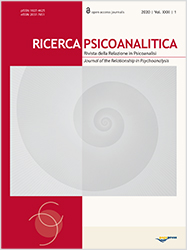Scritti
20 febbraio 2020
V. 27 N. 2 (2016): Pubblicato da FrancoAngeli
l'enactment e la self-disclosure in un"ottica relazionale: la soggettività dell'analista
Publisher's note
All claims expressed in this article are solely those of the authors and do not necessarily represent those of their affiliated organizations, or those of the publisher, the editors and the reviewers. Any product that may be evaluated in this article or claim that may be made by its manufacturer is not guaranteed or endorsed by the publisher.
All claims expressed in this article are solely those of the authors and do not necessarily represent those of their affiliated organizations, or those of the publisher, the editors and the reviewers. Any product that may be evaluated in this article or claim that may be made by its manufacturer is not guaranteed or endorsed by the publisher.
595
Visite
0
Downloads










